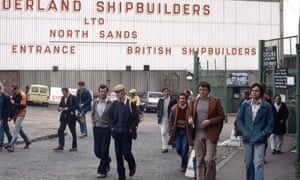
Shipbuilders in Sunderland in the 1980s. Photograph: Sally and Richard Greenhill / Al/Alamy
Just as the pound was reaching its peak, Iain Duncan Smith said: “Turnout in the council estates is very high.” It was about quarter past ten. When he added a few minutes later that he’d been in politics for 24 years and couldn’t remember seeing an equivalent council-estate turnout before, David Dimbleby wondered about its significance: was it good news for the Brexit campaign? Duncan Smith said piously that he couldn’t possibly say, but we knew that he thought it was. By midnight, the pound had begun its fall.
My wife and I grew up on council estates – small, well-gardened ones, a hundred miles from each other across the border of Scotland and England. Almost everyone we knew lived similarly. People of our parents’ generation thought of public housing as a blessing, compared to the shabby and cramped homes they had lived in before. “They talk about council estates as though they’re slums,” my wife said as we watched the coverage. Or native reservations, I thought. Earlier that day on our London high street, a canvasser for remain told me how they divided the work: the Greens got the tube stations, Lib Dems did the shoppers, Labour went “round the estates”.
And, outside Scotland and London, they were mostly ignored. “A large constituency of working-class voters feel that not only has the economy left them behind, but so has the culture,” the American political philosopher Michael Sandel said in a recent interview. “The sources of their dignity, the dignity of labour, have been eroded and mocked by … globalisation, the rise of finance, the attention that is lavished by parties across the political spectrum on economic and financial elites, [and] the technocratic emphasis of the established political parties.” A lot of the energy animating Brexit, said Sandel, had been “born of this failure of elites”.
Just as the pound was reaching its peak, Iain Duncan Smith said: “Turnout in the council estates is very high.” It was about quarter past ten. When he added a few minutes later that he’d been in politics for 24 years and couldn’t remember seeing an equivalent council-estate turnout before, David Dimbleby wondered about its significance: was it good news for the Brexit campaign? Duncan Smith said piously that he couldn’t possibly say, but we knew that he thought it was. By midnight, the pound had begun its fall.
My wife and I grew up on council estates – small, well-gardened ones, a hundred miles from each other across the border of Scotland and England. Almost everyone we knew lived similarly. People of our parents’ generation thought of public housing as a blessing, compared to the shabby and cramped homes they had lived in before. “They talk about council estates as though they’re slums,” my wife said as we watched the coverage. Or native reservations, I thought. Earlier that day on our London high street, a canvasser for remain told me how they divided the work: the Greens got the tube stations, Lib Dems did the shoppers, Labour went “round the estates”.
And, outside Scotland and London, they were mostly ignored. “A large constituency of working-class voters feel that not only has the economy left them behind, but so has the culture,” the American political philosopher Michael Sandel said in a recent interview. “The sources of their dignity, the dignity of labour, have been eroded and mocked by … globalisation, the rise of finance, the attention that is lavished by parties across the political spectrum on economic and financial elites, [and] the technocratic emphasis of the established political parties.” A lot of the energy animating Brexit, said Sandel, had been “born of this failure of elites”.
Sandel refers to a failure common to the western world. But when did the elites begin to fail Britain in particular? An economic historian might point to a period in the late 19th century when Germany overtook Britain in chemical research and technical education and, together with America, began to replace it as the world’s supreme industrial nation. But that was an unconscious failure; active betrayal has come within living memory. As a journalist working in the 1960s and 1970s, I grew used to the story of the factory closure, but only in the 1980s did these apparently random events accumulate to become known by a word, deindustrialisation, that implied a process governments either couldn’t stop, chose not to stop, or took steps to encourage.
The effects across large parts of Britain were spectacular. The big industrial cities had stored up enough capital in terms of public institutions and professional jobs to survive and sometimes prosper as regional capitals. But their hinterlands – the settlements strung along smoky valleys and perched on the oily river’s edge – began to look as abandoned as goldrush towns. Coatbridge, Consett, Hartlepool, Merthyr, Sunderland, Burnley, Greenock, Accrington: unless a senior football team played or a murder took place, they dropped from the national consciousness.
The depth of their oblivion was exemplified when, in a referendum debate on Sky TV, Michael Gove spoke of how his father’s fish business in Aberdeen had been “destroyed by the European Union”, which had “hollowed out” communities across Britain. In fact, a report in the Guardian showed that the senior Gove had sold his business rather than closed it, and that factors other than the EU were then shrinking Aberdeen’s fishing industry, including over-fishing.
What nobody remarked on was the absurdity of Gove calling the EU a job destroyer, when far heavier destruction was inflicted by British government policy during those years. When Mrs Thatcher came to office in 1979, manufacturing accounted for almost 30% of Britain’s national income and employed 6.8 million people; by 2010, it accounted for 11% and employed 2.5 million. And, unlike Mr Gove, a welder who was thrown out of work by a closing Sunderland shipyard had no business to sell.
In no other major economy was industrial collapse so quick. For a time, well-meaning journalists reported the catastrophe, and then gradually the sight of empty towns and shuttered shops became normalised or forgotten.
It seemed there was nothing to be done. At one time, the country’s prosperity had been underpinned by the spinning, weaving, stitching, hammering, banging, welding and smelting that went on in the manufacturing towns; much of the country’s former character was also owed to them – non-conformist chapels, brass bands, giant vegetable championships, self-improvement, association football. Surely nothing as significant to the nation’s economy, culture or politics would ever emerge from them again? And then it did: grievance. Actually, more than that: the sudden discovery that in certain and perhaps unrepeatable circumstances, the poor could use their grievance about all kinds of things to change at least one.
It first became apparent in the Scottish referendum of 2014. Only four local voting areas out of 32 returned a majority for independence and all of them bore the scars of vanished industries. The SNP had broken through years of eroding Labour tradition to capture the loyalty of people in the big housing schemes, for whom the leap in the dark of constitutional change offered promise rather than threat (after all, what else had worked?). By the time of last year’s general election, thousands of underprivileged local authority tenants felt themselves for the first time to be part of a political movement. I noticed the paradox after Nicola Sturgeon addressed an anti-Trident rally in Glasgow, and wrote: “Only now, with the west of Scotland nearly expunged as an economic force, does the political will of its people keep the rest of the country awake.”
On Thursday, much of northern England went to vote in a similar mood. Immigration, actual or potential, mattered too. There may also have been Spitfire enthusiasts. But betrayal, grievance, dispossession: these were surely what counted for most. I feel sorrow that the British story should have such an unexpected end – murdered by the poor and neglected English who were already inside the keep.
The effects across large parts of Britain were spectacular. The big industrial cities had stored up enough capital in terms of public institutions and professional jobs to survive and sometimes prosper as regional capitals. But their hinterlands – the settlements strung along smoky valleys and perched on the oily river’s edge – began to look as abandoned as goldrush towns. Coatbridge, Consett, Hartlepool, Merthyr, Sunderland, Burnley, Greenock, Accrington: unless a senior football team played or a murder took place, they dropped from the national consciousness.
The depth of their oblivion was exemplified when, in a referendum debate on Sky TV, Michael Gove spoke of how his father’s fish business in Aberdeen had been “destroyed by the European Union”, which had “hollowed out” communities across Britain. In fact, a report in the Guardian showed that the senior Gove had sold his business rather than closed it, and that factors other than the EU were then shrinking Aberdeen’s fishing industry, including over-fishing.
What nobody remarked on was the absurdity of Gove calling the EU a job destroyer, when far heavier destruction was inflicted by British government policy during those years. When Mrs Thatcher came to office in 1979, manufacturing accounted for almost 30% of Britain’s national income and employed 6.8 million people; by 2010, it accounted for 11% and employed 2.5 million. And, unlike Mr Gove, a welder who was thrown out of work by a closing Sunderland shipyard had no business to sell.
In no other major economy was industrial collapse so quick. For a time, well-meaning journalists reported the catastrophe, and then gradually the sight of empty towns and shuttered shops became normalised or forgotten.
It seemed there was nothing to be done. At one time, the country’s prosperity had been underpinned by the spinning, weaving, stitching, hammering, banging, welding and smelting that went on in the manufacturing towns; much of the country’s former character was also owed to them – non-conformist chapels, brass bands, giant vegetable championships, self-improvement, association football. Surely nothing as significant to the nation’s economy, culture or politics would ever emerge from them again? And then it did: grievance. Actually, more than that: the sudden discovery that in certain and perhaps unrepeatable circumstances, the poor could use their grievance about all kinds of things to change at least one.
It first became apparent in the Scottish referendum of 2014. Only four local voting areas out of 32 returned a majority for independence and all of them bore the scars of vanished industries. The SNP had broken through years of eroding Labour tradition to capture the loyalty of people in the big housing schemes, for whom the leap in the dark of constitutional change offered promise rather than threat (after all, what else had worked?). By the time of last year’s general election, thousands of underprivileged local authority tenants felt themselves for the first time to be part of a political movement. I noticed the paradox after Nicola Sturgeon addressed an anti-Trident rally in Glasgow, and wrote: “Only now, with the west of Scotland nearly expunged as an economic force, does the political will of its people keep the rest of the country awake.”
On Thursday, much of northern England went to vote in a similar mood. Immigration, actual or potential, mattered too. There may also have been Spitfire enthusiasts. But betrayal, grievance, dispossession: these were surely what counted for most. I feel sorrow that the British story should have such an unexpected end – murdered by the poor and neglected English who were already inside the keep.

